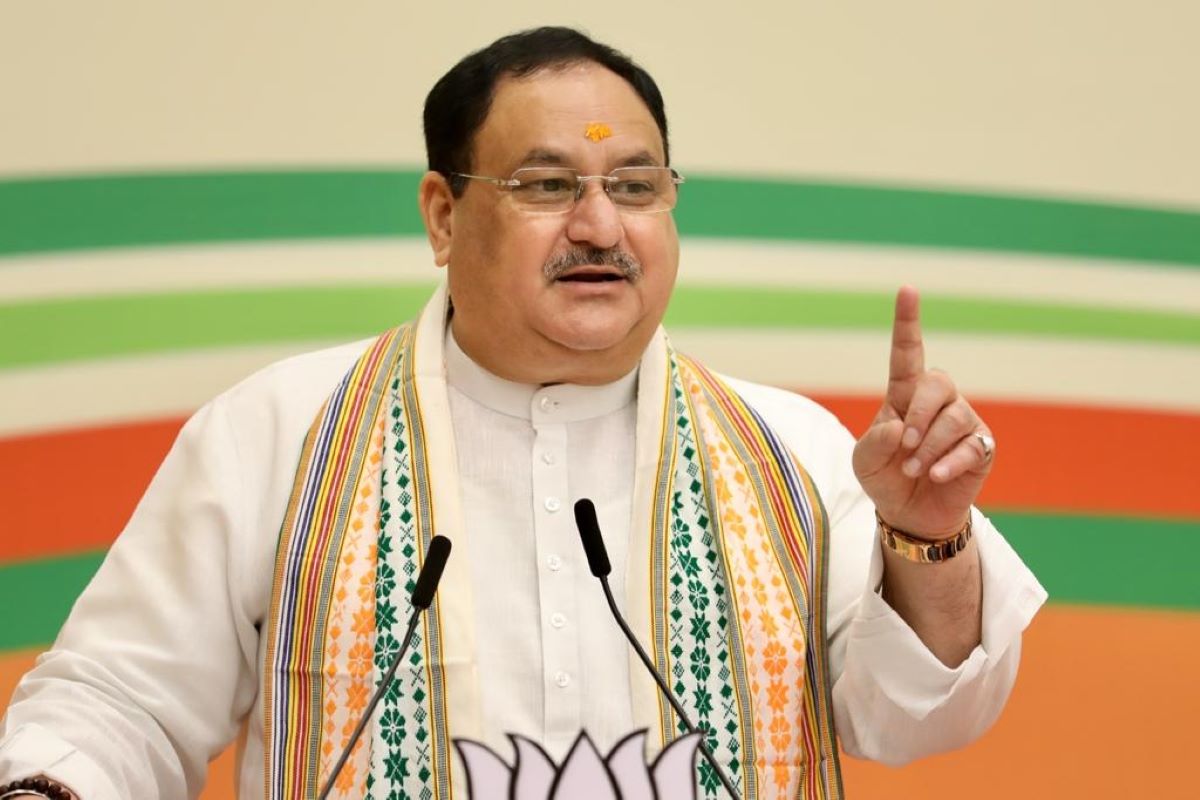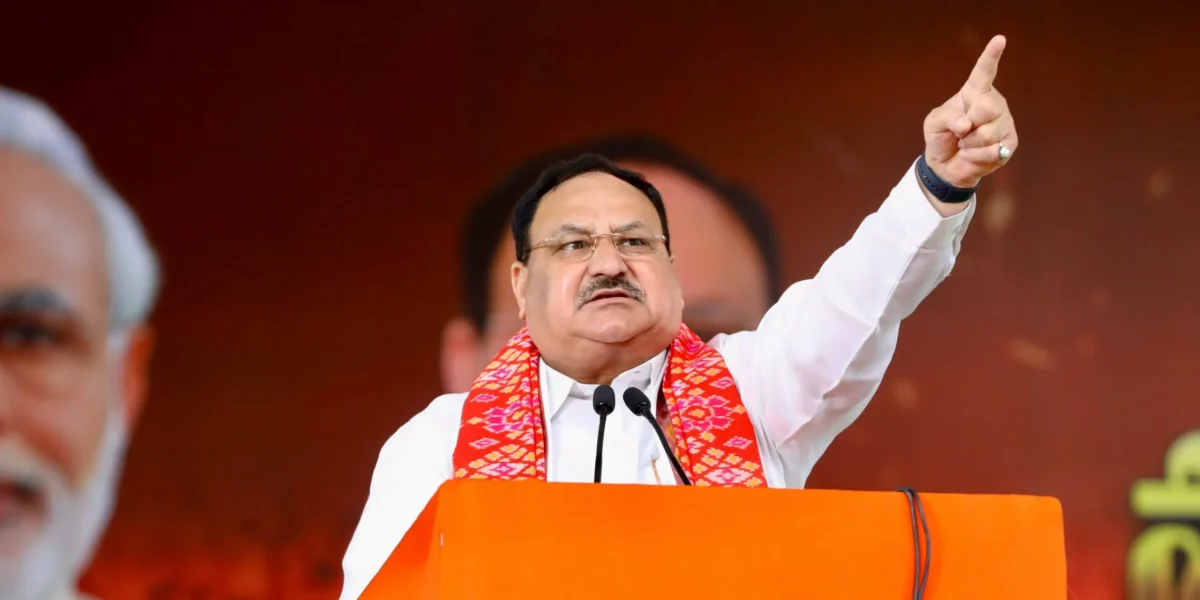In a resounding declaration, Bharatiya Janata Party (BJP) President Jagat Prakash Nadda asserted that the BJP is the only true national party in India, standing strong amidst a proliferation of regional and ‘family outfits’ across the country. Nadda’s statement comes as the party gears up for a series of state elections and amid ongoing debates about the state of Indian politics.
Table of Contents
The Proliferation of Regional and ‘Family Outfits’
Over the years, India’s political landscape has witnessed the emergence of several regional parties led by prominent political families. These parties, often characterized as ‘family outfits,’ have played a significant role in shaping the political narrative at the state level. The BJP’s claim of being the sole national party challenges the dominance of these regional players.
Nadda’s proclamation about the BJP’s national status highlights the party’s aspirations and ambitions. In recent years, the BJP has expanded its footprint beyond its traditional strongholds and made significant inroads in states where it was historically considered a marginal player. This shift in the political dynamics has fueled the party’s desire to be recognized as the only national party in India.

Responses and Reactions to Nadda’s Assertion
Nadda’s statement has sparked a flurry of responses and reactions from various quarters of the political spectrum. While some see it as a bold claim backed by electoral success, others view it as a divisive move in an already polarized political climate. In this article, we delve deeper into the implications of Nadda’s assertion and analyze the responses it has generated.
The Bharatiya Janata Party (BJP), one of India’s major political parties, has been on a journey to establish itself as the sole national party in the country. The party’s quest for this recognition has gained momentum in recent years, as it continues to expand its presence beyond its traditional strongholds. This ambition was prominently voiced by BJP President Jagat Prakash Nadda, who declared that the BJP is the only party fighting as a national party amid a sea of ‘family outfits.’
Nadda’s assertion reflects the BJP’s growing confidence in its electoral performance and organizational strength. The party has steadily increased its presence in various states, forming governments in several of them. This has raised questions about the status of regional parties led by prominent political families and whether they can truly be considered national parties.
BJP and Political Landscape
The political landscape in India is marked by a multitude of parties, ranging from national parties like the BJP, Indian National Congress (INC), and the Communist Party of India (Marxist) to numerous regional and state-specific parties. Among the regional parties, many are known for being family-centric, where leadership is passed down through generations.
The Proliferation of Regional and ‘Family Outfits’
India’s political arena has seen the emergence and growth of regional parties that are often led by dynastic leadership. These parties operate primarily within specific states or regions and have strong regional identities. They are seen as the political representatives of the local populace and advocate for regional issues.

Prominent examples of such regional parties include the Dravida Munnetra Kazhagam (DMK) in Tamil Nadu, the Shiv Sena in Maharashtra, and the Samajwadi Party (SP) in Uttar Pradesh, among others. These parties have long-established dominance in their respective states and play a crucial role in state-level politics.
Critics argue that the proliferation of regional parties with dynastic leadership has contributed to a fragmented political landscape, making it challenging for national parties to maintain their dominance at the state level. Additionally, the dominance of regional parties can lead to a lack of coherence and coordination at the national level, hindering the formulation and implementation of comprehensive national policies.
BJP’s Quest for National Party Status
The BJP’s journey to establish itself as the sole national party has been marked by significant electoral victories and strategic expansion efforts. The party’s rise to prominence can be attributed to various factors, including charismatic leadership, a well-organized election machinery, and a robust communication strategy.
Under the leadership of Prime Minister Narendra Modi, the BJP secured a historic mandate in the 2014 Lok Sabha elections, winning 282 out of 543 seats. This victory not only paved the way for the formation of a stable central government but also solidified the BJP’s position as a national party. The party repeated its success in the 2019 general elections, securing an even larger mandate.
The BJP’s electoral triumphs extended beyond the national level, with the party forming governments in several states where it had historically been a minor player. States like Uttar Pradesh, Bihar, and Gujarat witnessed the BJP’s ascendancy to power, challenging the dominance of regional parties. This electoral success has been a significant driving force behind the party’s claim to national party status.
Responses and Reactions to Nadda’s Assertion
Jagat Prakash Nadda’s declaration that the BJP is the only true national party in India has evoked mixed reactions from various quarters of the political spectrum. Here, we examine some of the responses and analyze the implications of his statement.
Unsurprisingly, BJP leaders and members have overwhelmingly supported Nadda’s assertion. They argue that the party’s electoral victories and its presence in almost every state make it a deserving candidate for national party status. This sentiment is shared by many party workers and loyalists who believe that the BJP represents the aspirations of a large section of the Indian population.

Leaders of opposition parties have criticized Nadda’s statement, dismissing it as a political gimmick. They argue that the BJP’s claim to national party status is merely a tactic to marginalize regional parties and consolidate power at the national level. Opposition leaders maintain that the BJP’s dominance in the Lok Sabha does not automatically make it a national party and that it should respect the diversity of India’s political landscape.
Challenges and the Way Forward
While the BJP maintains its status as a national party, it faces challenges from both regional parties and emerging political outfits. To sustain its position, the BJP needs to adapt to the changing dynamics of Indian politics and address the concerns of diverse regional aspirations.
One of the key challenges for the BJP lies in striking a balance between its nationalistic agenda and the aspirations of regional identities. The party must ensure that the interests and concerns of various states and regions are adequately represented within its larger framework. By nurturing local leaders and engaging with regional issues, the BJP can strengthen its national presence while respecting regional diversity. Nadda, in his statement, highlighted the BJP’s distinct position as a national party, contrasting it with the “family outfits” that dominate regional politics. The BJP’s ideology, organizational structure, and pan-India presence distinguish it from other parties that tend to be restricted to specific regions or communities.
BJP’s Focus on Inclusive Growth
The BJP’s focus on nationalism, cultural identity, and development has resonated with a vast section of the Indian populace, enabling it to establish a broad-based support base. The party’s emphasis on inclusive growth and social welfare schemes has further bolstered its appeal across different sections of society. As a result, the BJP has been successful in transcending regional boundaries and emerging as a national force.
Some political analysts and experts have expressed concerns that Nadda’s assertion could further polarize the political discourse in India. They argue that the BJP’s claim, if perceived as an attempt to undermine regional parties, may lead to heightened tensions between regional and national political forces. Such polarization could hinder the collaborative approach required for effective governance.

To be officially recognized as a national party by the Election Commission of India, a party must meet certain criteria, including winning at least 2% of the seats in the Lok Sabha from at least three different states in a general election or securing 6% of the total votes in four different states. While the BJP’s recent electoral performances have brought it closer to meeting these criteria, it has not yet achieved the official status of a national party.
The BJP’s assertion of being the only national party in India, as declared by party president Jagat Prakash Nadda, is a reflection of the party’s growing influence and ambition in Indian politics. While the BJP has made significant electoral inroads in various states, the question of national party status remains subject to official recognition by the Election Commission of India.
The assertion also raises important questions about the role of regional and ‘family outfits’ in Indian politics. Regional parties, with their strong regional identities and dynastic leadership, continue to wield considerable influence at the state level. The debate over whether these parties can be considered truly national remains a point of contention.
As India’s political landscape evolves, the assertion of national party status by the BJP underscores the ongoing power struggle and ideological divisions in the country’s politics. It remains to be seen how this claim will shape the future of Indian politics and whether it will lead to a reconfiguration of the political landscape.



